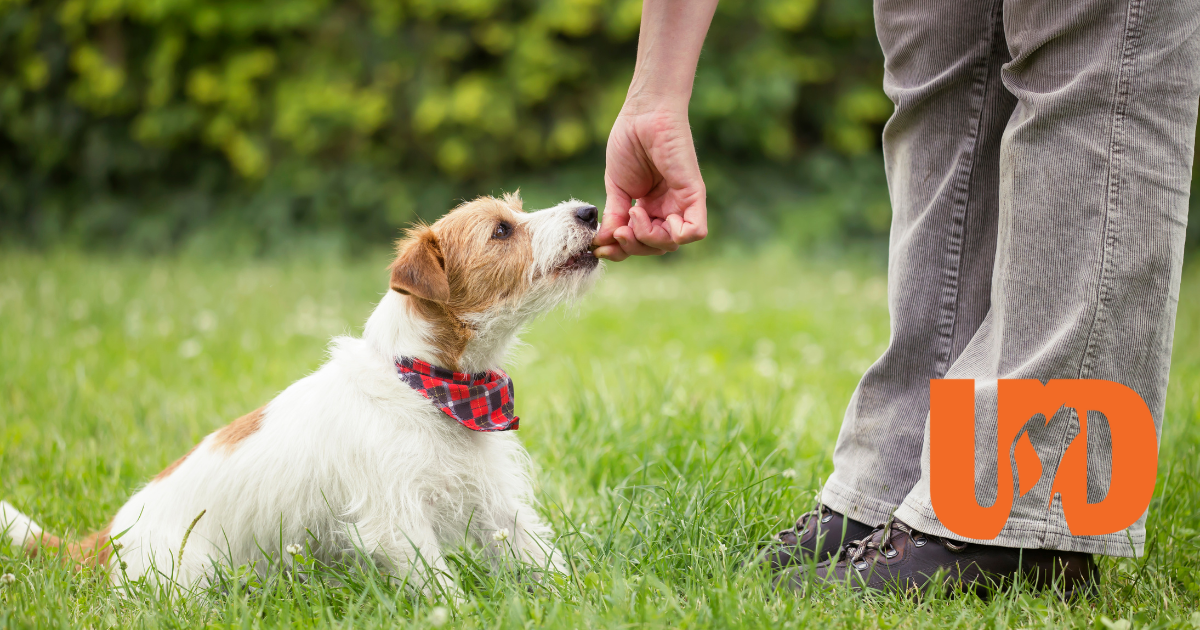The Power of Positive Reinforcement — And Its Hidden Pitfalls Positive reinforcement is one of…
Myth Busting: You CAN Teach an Old Dog New Tricks
At University of Dog, we debunk myths and give dog owners the most accurate information to support their furry families. One widespread misconception we’re tackling today is the saying, “You can’t teach an old dog new tricks.”
This outdated cliché just isn’t true. The fact is, teaching an old dog new tricks is not only possible but also beneficial –sometimes, it’s even necessary for the overall well-being of your pet. Let’s dive in.
Can you train an older dog?
That’s the question we’re putting under the microscope today. In brief, the answer is a resounding YES. The experts agree: it’s not just doable; it’s highly encouraged.
Our university’s founder, Tecla Walton, has plenty of experience helping older dogs learn new behaviors. She has successfully trained a number of older dogs, one of her favorites a leash-reactive 9-year-old husky mix.
The dog’s owners were skeptical. Considering the husky’s age and ingrained habits, they didn’t believe changing their pet’s behavior was possible. But with patience, dedication, and the proper techniques, Tecla taught this old dog new tricks.
Your dog’s age should never be a barrier to learning new commands or unlearning old behaviors. The notion that you can’t teach an old dog new tricks is simply untrue, and we’re here to show you why.
Myth: You can’t teach an old dog new tricks.
It’s helpful to debunk this myth by understanding where it originates. The phrase “you can’t teach an old dog new tricks” isn’t born from scientific or behavioral studies on dogs. It’s actually an idiom.
The expression gained popularity through English writer John Heywood in 1564, but it goes back even further to a treatise on farming by John Fitzherbert in 1523. We won’t bore you with the old English, but if you’re interested, it translates to: “A dog must learn when he is a new puppy, or else it will be hard for him to comply.”
It’s easy to see how this notion evolved into our current expression. However, it’s important to remember that idioms often reflect the societal understanding of the time they were created in. (And, while we agree that early training of puppies is a best practice, it doesn’t mean that an older dog can not learn or be helped through training.)
We wouldn’t take medical advice from the 16th century, so why would we hold onto this idiom as a fact in our modern understanding of dogs and their training capabilities?
Contrary to this well-known saying, you can teach an old dog new tricks. It can take more patience and persistence, but it’s possible and beneficial to the dog.
Fact: You CAN Teach an Old Dog New Tricks
Imagine how some newly retired people can feel somewhat lost or even unhealthy when they stop their lifelong routine of work and the social interactions that come with it. They often feel better if they stay active, try new hobbies, and keep having fun. It’s the same with older dogs.
Continuing to challenge your dog’s mental faculties is like giving them a new game to play. They get excited and stay active. An idle dog is prone to both physical and mental health issues, but a dog who is always learning and engaging in ongoing training maintains its zest for life.
What are the health benefits of teaching an old dog new tricks?
Training isn’t just about teaching behaviors that benefit the lifestyle of their human caretakers. It also has many health benefits for the dog, particularly as they age. Teaching an old dog new tricks gives them a renewed sense of purpose and challenges their mind, which can help reduce the risk of canine cognitive dysfunction, a condition similar to dementia in humans.
Our owner Tecla has seen these health benefits firsthand. Two of her personal dogs were diagnosed with cancer in their later years, one with lung cancer and another with bone cancer, and each were only given six months to live. Yet they lived for three more years with supportive care and new hobbies such as rally and nose work. And the dogs did more than extend their lifespan – they thrived – even winning trials.
Below, you can see a video of one of the dogs –Skye. Despite losing her leg in 2013 to osteosarcoma, her love for life and work didn’t waver. Her spirited performance in this video and the bond between her and Tecla truly demonstrate how old dogs are indeed capable of mastering new tricks.
Preventing and Managing Dementia and Sundowners in Dogs
Teaching old dogs new tricks can help to prevent and manage dementia and sundowning in dogs, a form of dementia in that’s also known as sundowners. According to Cornell’s Canine Health Center, environmental enrichment and cognitive stimulation for older dogs is highly beneficial in managing these conditions.
Activities that vary and challenge your dog are crucial but within a predictable routine. The Center advocates teaching an old dog new tricks, engaging them in sniff walks that prioritize exploration over exercise, and using new food puzzles to keep their minds sharp and active.
Moreover, many veterinary clinics recommend similar strategies for teaching an old dog new tricks – playing games together, regular exercise, new experiences, and socialization. These activities prevent cognitive decline and sundowners in dogs.
A significant study by the University of Washington, involving 15,019 dogs as part of the Dog Aging Project, found that exercise is pivotal in preventing cognitive dysfunction. The study discovered that dogs reported as not active were 6.47 times more likely to be diagnosed with cognitive dysfunction than those reported to be very active.
This compelling evidence demonstrates that maintaining an active lifestyle for your dog and teaching old dogs new tricks greatly benefits their cognitive health and quality of life. In debunking the myth that “you can’t teach an old dog new tricks,” we enable our dogs to learn and grow while actively contributing to their longevity and wellness.
Teach Your Old Dog New Tricks at University of Dog
While we’ve debunked the myth and proved you can teach an old dog new tricks, knowing how to do it effectively can be challenging without the proper guidance. At University of Dog, we’re passionate about helping you train your dog.
Our program, developed by Tecla Walton, a certified dog trainer with over 25 years of experience, is designed to teach YOU, not just your dog. We believe dog training is a science and an art; each dog-owner relationship is unique. We focus on how you and your dog relate to each other to make training effective, regardless of your dog’s age.
You CAN teach an old dog new tricks, and University of Dog is here to show you how. Ready to get started? Take a course with us today.



